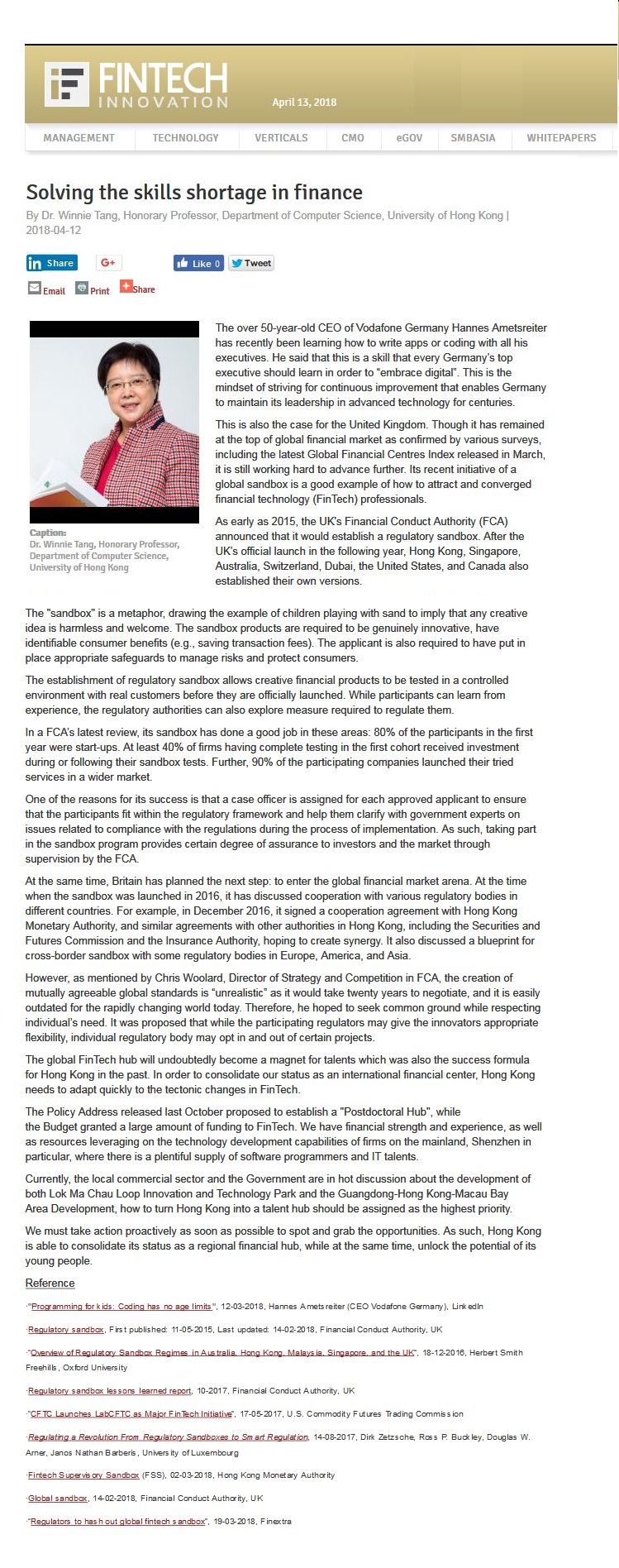網上版請按此

Solving the skills shortage in finance
The over 50-year-old CEO of Vodafone Germany Hannes Ametsreiter has recently been learning how to write apps or coding with all his executives. He said that this is a skill that every Germany's top executive should learn in order to "embrace digital". This is the mindset of striving for continuous improvement that enables Germany to maintain its leadership in advanced technology for centuries.
This is also the case for the United Kingdom. Though it has remained at the top of global financial market as confirmed by various surveys, including the latest Global Financial Centres Index released in March, it is still working hard to advance further. Its recent initiative of a global sandbox is a good example of how to attract and converged financial technology (FinTech) professionals.
As early as 2015, the UK's Financial Conduct Authority (FCA) announced that it would establish a regulatory sandbox. After the UK's official launch in the following year, Hong Kong, Singapore, Australia, Switzerland, Dubai, the United States, and Canada also established their own versions.
The "sandbox" is a metaphor, drawing the example of children playing with sand to imply that any creative idea is harmless and welcome. The sandbox products are required to be genuinely innovative, have identifiable consumer benefits (e.g., saving transaction fees). The applicant is also required to have put in place appropriate safeguards to manage risks and protect consumers.
The establishment of regulatory sandbox allows creative financial products to be tested in a controlled environment with real customers before they are officially launched.
While participants can learn from experience, the regulatory authorities can also explore measure required to regulate them.
In a FCA's latest review, its sandbox has done a good job in these areas: 80% of the participants in the first year were start-ups. At least 40% of firms having complete testing in the first cohort received investment during or following their sandbox tests. Further, 90% of the participating companies launched their tried services in a wider market.
One of the reasons for its success is that a case officer is assigned for each approved applicant to ensure that the participants fit within the regulatory framework and help them clarify with government experts on issues related to compliance with the regulations during the process of implementation. As such, taking part in the sandbox program provides certain degree of assurance to investors and the market through supervision by the FCA.
At the same time, Britain has planned the next step: to enter the global financial market arena. At the time when the sandbox was launched in 2016, it has discussed cooperation with various regulatory bodies in different countries. For example, in December 2016, it signed a cooperation agreement with Hong Kong Monetary Authority, and similar agreements with other authorities in Hong Kong, including the Securities and Futures Commission and the Insurance Authority, hoping to create synergy. It also discussed a blueprint for cross-border sandbox with some regulatory bodies in Europe, America, and Asia.
However, as mentioned by Chris Woolard, Director of Strategy and Competition in FCA, the creation of mutually agreeable global standards is "unrealistic" as it would take twenty years to negotiate, and it is easily outdated for the rapidly changing world today. Therefore, he hoped to seek common ground while respecting individual's need. It was proposed that while the participating regulators may give the innovators appropriate flexibility, individual regulatory body may opt in and out of certain projects.
The global FinTech hub will undoubtedly become a magnet for talents which was also the success formula for Hong Kong in the past. In order to consolidate our status as an international financial center, Hong Kong needs to adapt quickly to the tectonic changes in FinTech.
The Policy Address released last October proposed to establish a "Postdoctoral Hub", while the Budget granted a large amount of funding to FinTech. We have financial strength and experience, as well as resources leveraging on the technology development capabilities of firms on the mainland, Shenzhen in particular, where there is a plentiful supply of software programmers and IT talents.
Currently, the local commercial sector and the Government are in hot discussion about the development of both Lok Ma Chau Loop Innovation and Technology Park and the Guangdong-Hong Kong-Macau Bay Area Development, how to turn Hong Kong into a talent hub should be assigned as the highest priority.
We must take action proactively as soon as possible to spot and grab the opportunities. As such, Hong Kong is able to consolidate its status as a regional financial hub, while at the same time, unlock the potential of its young people.
Dr. Winnie Tang
Honorary Professor, Department of Computer Science, The University of Hong Kong